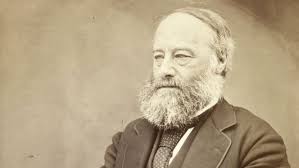James Prescott Joule was an English physicist who studied the nature of heat and discovered its relationship to mechanical work. This study later led to formation of the first law of thermodynamics.
Early life
James Prescott Joule was born on December 24, 1818 in Salford, England. Joule was a son to Benjamin Joule, a wealthy brewer, and Alice Prescott Joule.
Education
Joule was tutored at his home in Pendlebury, near Salford.In 1834 he was sent along with his elder brother Benjamin, to study with John Dalton at the Manchester Literary and Philosophical Society. There he only received two years of education in arithmetic and geometry due to Dalton’s illness. However, time spent with John Dalton and his associates left Joule intrigued. He was latter tutored by John Davies.
Achievements
James Joule took over the brewery and was actively involved until 1854 when it was sold. At that time science was his hobby, and he slowly started implementing his knowledge of electricity in his business by replacing the brewery’s steam engines with the newly invented electric motor. In 1840, Joule formulated his Joule’s laws but was met with disbelief and skepticism. Later Joule began to speculate about the convertibility of energy. In 1843 he published results of experiments that were a direct challenge to the caloric theory which was popular and was considered to be the benchmark in heat related studies. Joules later discovered that 772.55 ft·lbf of work is needed to raise the temperature of a pound of water by one degree Fahrenheit, thus disproving the calorific theory.
Later life
Joule married Amelia Grimes on August 18th, 1847 and had two children. Joule died on October 11th, 1889 at home in Sale and is buried in Brooklands cemetery.
James Prescott Joule quotes
“After the knowledge of, and obedience to, the will of God, the next aim must be to know something of His attributes of wisdom, power, and goodness as evidenced by His handiwork.”
“Believing that the power to destroy belongs to the Creator alone I affirm… that any theory which, when carried out, demands the annihilation of force, is necessarily erroneous.”
“It is evident that an acquaintance with natural laws means no less than an acquaintance with the mind of God therein expressed.”

